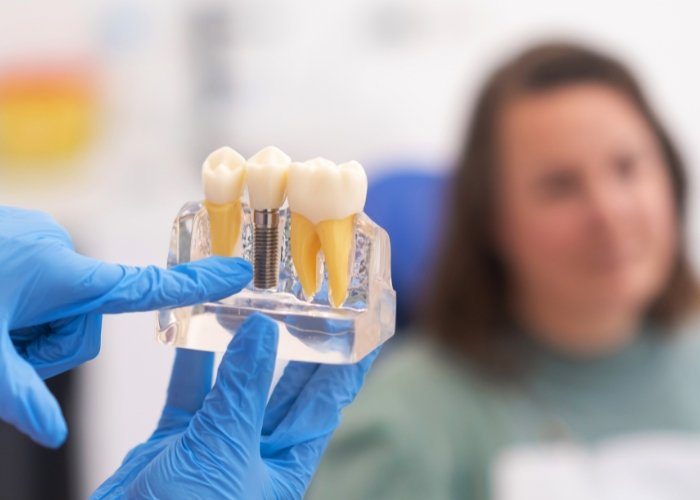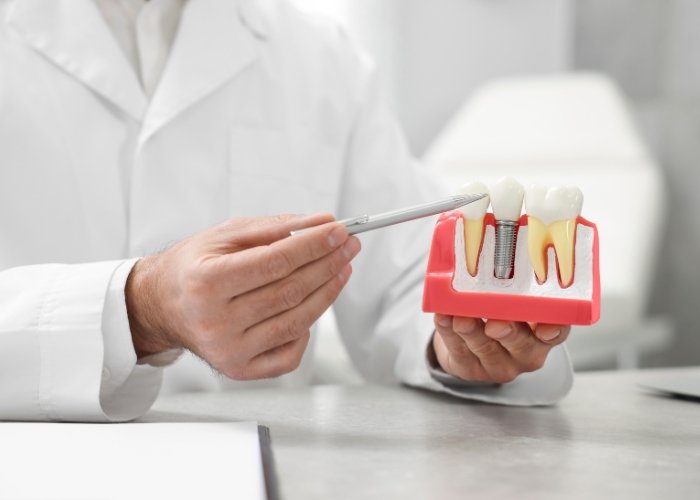Dental implants have become an increasingly popular solution for replacing missing teeth, offering a long-lasting, natural-looking option. However, the cost is one of the most common concerns for potential patients. This blog will guide you through everything you need about dental implant costs, the procedure steps, and the long-term care required to maintain your implants.
Understanding Dental Implant Costs
How Much Do Dental Implants Cost?
The cost of dental implants can vary significantly depending on various factors, including the number of implants needed, the procedure’s complexity, and the dental practice’s geographic location. A single dental implant can cost between $3,000 to $5,000. This price typically includes the implant, abutment, and crown.

Cost of Full Mouth Dental Implants
The cost can escalate for those requiring a full-mouth restoration. Full-mouth dental implants, also known as All-on-4 or All-on-6, can range from $20,000 to $50,000 per arch, depending on the materials used and the specific technique employed.
Affordable and Low-Cost Dental Implants
While dental implants are a significant investment, there are ways to make them more affordable. Some dental practices offer financing options or payment plans to help spread the cost over time. Additionally, you might find low-cost dental implants at dental schools, where supervised students perform the procedures at a reduced rate.
Does Insurance cover Dental Implants?
Dental insurance plans vary widely, but most do not cover the full cost of implants. However, some plans may cover part of the procedure, such as the crown or abutment. You must check with your insurance provider to understand your coverage and consider supplementary dental insurance or savings plans.
Dental Implant Cost Comparison
When considering dental implants, comparing prices from different providers is crucial. Be sure to ask for a detailed breakdown of the costs, including any potential additional expenses, such as bone grafting or sinus lifts. Remember, while finding cheap dental implants near you might be tempting, it’s essential to prioritize quality and experience to ensure the best outcome.
The Dental Implant Procedure: Step by Step
Step by Step Dental Implant Process
The dental implant procedure involves several stages, including initial consultation and planning. During this phase, your dentist will assess your oral health, take X-rays, and discuss your treatment options.
- Initial Consultation and Planning: Your dentist will evaluate your overall health and oral condition to ensure you are a good candidate for implants. This includes discussing your medical history, taking impressions, and planning the implant placement using 3D imaging technology.
- Implant Placement: The next step is surgically placing the implant into your jawbone. This is typically done under local anesthesia, although sedation options are available. The implant is a small titanium post that acts as a root for the artificial tooth.
- Healing and Osseointegration: After the implant is placed, it needs time to heal and integrate with the jawbone, known as osseointegration. This can take several months, during which the bone grows around the implant, securing it firmly in place.
- Abutment Placement: Once the implant has fully integrated, an abutment is attached to the implant. The abutment acts as a connector between the implant and the artificial tooth or crown.
- Crown Placement: Finally, a custom-made crown is attached to the abutment. The crown is designed to match the color and shape of your natural teeth, providing a seamless appearance.
What to Expect During and After Dental Implant Surgery
The dental implant surgery is generally straightforward, with most patients experiencing minimal discomfort. Local anesthesia will numb the area during the procedure, so you won’t feel any pain. Some patients may feel pressure or hear sounds as the implant is placed.
How Long Does a Dental Implant Procedure Take?
The entire dental implant process can take several months from start to finish. The surgery itself usually takes about 1-2 hours per implant, but the healing process can take 3-6 months, depending on individual circumstances.
Pain and Healing Stages
It’s normal to experience some pain and swelling after the surgery, but this typically subsides within a few days. Your dentist may prescribe pain medication to help manage any discomfort. The healing stages include the initial recovery period, where the gum tissue heals, followed by osseointegration.
What to Expect After Dental Implant Surgery
After the surgery, it’s essential to follow your dentist’s aftercare instructions to promote healing and avoid complications. This includes taking prescribed medications, eating soft foods, and avoiding strenuous activities.
Long-Term Care for Dental Implants

Dental Implant Aftercare
Proper care is crucial to the long-term success of your dental implants. Immediately after surgery, maintain good oral hygiene by gently brushing the surgical area and using an antimicrobial mouthwash to prevent infection.
How to Care for Dental Implants
Once your implants have healed, care for them as you would your natural teeth. This includes regular brushing, flossing, and routine dental check-ups. It’s also essential to clean around the implant area thoroughly to prevent plaque buildup.
Long-Term Maintenance of Dental Implants
Regular dental visits are vital to monitor the health of your implants. During these visits, your dentist will check the implant’s stability, the condition of the surrounding gum tissue, and the integrity of the crown.
How Long Do Dental Implants Last?
With proper care, dental implants can last a lifetime. However, the crown attached to the implant may need to be replaced every 10-15 years due to wear and tear.
Cleaning and Foods to Avoid
Avoid hard or sticky foods that could damage the implant crown. Cleaning dental implants involves brushing twice a day, flossing daily, and using interdental brushes to clean hard-to-reach areas.
Potential Problems and Routine Check-Ups
While dental implants have a high success rate, it’s essential to be aware of potential issues such as implant failure or gum disease around the implant. Routine check-ups allow your dentist to catch any problems early and address them promptly.
In conclusion, dental implants are a valuable investment in your oral health, offering a permanent solution for missing teeth. Understanding the costs, procedure steps, and long-term care required will help you make an informed decision and ensure the longevity of your implants. Always consult with a qualified dentist to discuss your options and develop a treatment plan tailored to your needs.
